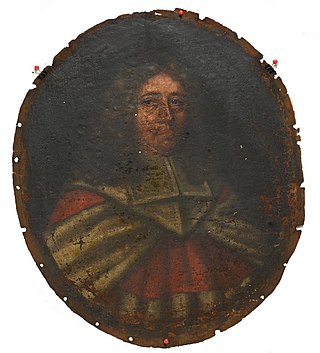Related Research Articles

The County Palatine of Tipperary Act 1715 is an act of the Parliament of Ireland. This act enabled the purchase by the crown of the Palatine Rights in County Tipperary given to the Earls of Ormond, later Dukes of Ormonde, over the preceding centuries. Prior to the act, the dukes appointed the sheriffs and judges of the county and owned certain revenues from the county which would otherwise have gone to the Crown.
The Recorder of Dublin was a judicial office holder in pre-Independence Ireland.
Sir Richard Bolton was an English lawyer and judge, who was an important figure in Irish political life in the 1630s and 1640s.
Sir Edmond Stanley SL (1760–1843) was an Anglo-Irish lawyer and politician who served as Serjeant-at-Law of the Parliament of Ireland, Recorder of Prince of Wales Island, now Penang, and subsequently Chief Justice of Madras. The elopement of his teenage daughter Mary Anne in 1815 caused a notable scandal. His career was hampered by his enormous debts, as a result of which he was forced to resign his Irish office.
This is a list of lawyers who held the rank of serjeant-at-law at the Bar of Ireland.
Sir Maurice Eustace was an Irish landowner, politician, barrister and judge of the seventeenth century who spent the last years of his career as Lord Chancellor of Ireland. This was an office for which he felt himself to be entirely unfit, and in which he was universally agreed to be a failure.
Sir Richard Pyne was an Irish landowner, barrister and judge. He held office as Lord Chief Justice of Ireland from 1695-1709.
Sir Richard Ryves (1643–1693) was a seventeenth-century Irish judge who served for several years as Recorder of Dublin, and subsequently as a Baron of the Exchequer. He was briefly a Commissioner of the Great Seal.
Sir William Ryves (1570–1647) was a barrister and judge, and a member of a distinguished Dorsetshire family. He enjoyed a successful legal career in Ireland, holding office as Attorney-General for Ireland and as a justice of the Court of King's Bench (Ireland). For a time he acted as Deputy to the Lord Chancellor of Ireland.

Sir Richard Reynell, 1st Baronet, was an English-born judge who had a distinguished career in Ireland and held office as Lord Chief Justice of the King's Bench in Ireland. He was the first of the Reynell baronets of Laleham.
Sir William Davys was an Irish barrister and judge who held the offices of Recorder of Dublin, Prime Serjeant and Lord Chief Justice of Ireland. He was suspected of Roman Catholic sympathies and was threatened with removal from the bench as a result, but he succeeded in retaining office until his death, due largely to his influential family connections.
Sir Nathaniel Catelyn, was a leading English-born politician and judge in seventeenth-century Ireland. He was Speaker of the Irish House of Commons in the Irish Parliament of 1634–5, Recorder of Dublin and the first holder of the office of Second Serjeant. Despite accusations of conflict of interest and of Roman Catholic sympathies, he retained the confidence of the Crown and was a key ally of Thomas Wentworth, 1st Earl of Strafford, the Lord Deputy of Ireland.
Sir John Barnewall (c.1635-c.1705) was an Irish landowner, barrister and judge, who held several judicial offices, including that of Recorder of Dublin 1687-9.
Sir William Sambach was an English-born lawyer and politician of the seventeenth century who spent much of his career in Ireland, but was driven back to England by the political turmoil of the 1640s, and died there.
Sir Henry Echlin, 1st Baronet (1652–1725) was an Irish barrister, judge, and bibliophile. He was the first of the Echlin Baronets of Clonagh, County Kildare.
Sir Jerome Alexander (c.1585–1670) was an English-born barrister, judge and politician, who spent much of his career in Ireland, and became a substantial Irish landowner. He was a noted benefactor of Trinity College Dublin. As a judge, he was so ruthless in securing guilty verdicts in criminal cases, and in imposing the death penalty on the guilty party, that for many years after his death "to be Alexandered" was an Irish synonym for being hanged.
Sir Richard Stephens was an Irish barrister, politician and judge of the seventeenth century. He was a highly successful lawyer, who made a fortune at the Bar, but his judicial career was hampered by his unorthodox religious and political views. He became Serjeant-at-law (Ireland) under King Charles II, but was dismissed from office after only two years. He was in political disgrace during the following reign. After the Glorious Revolution he was appointed to the Irish High Court bench, but he died only two years later.
William Worth (c.1646–1721) was an Irish judge of the late seventeenth and early eighteenth centuries.

Sir John Bere, whose surname was also spelt Beere or Bare, was an Irish politician, Crown official, barrister and part-time judge of the early seventeenth century. He held office as King's Serjeant, and sat in the Irish House of Commons in the Parliament of 1613–15.
The recorder of Carrickfergus was a judicial office-holder in pre-independence Ireland. The office dates from 1593, shortly after the incorporation of Carrickfergus. It was abolished by the new Government of Northern Ireland after the Partition of Ireland in 1921.
References
- Ball, F. Elrington The Judges in Ireland 1221-1921 John Murray London 1926
- Hart, A.R. History of the King's Serjeant-at-law in Ireland Four Courts Press Dublin 2000
- Kenny, Colum "King's Inns and the Kingdom of Ireland" Dublin Irish Academic Press 1992
- McSkimin, Samuel History and Antiquities of the county of the town of Carrickfergus from the earliest records to the present time Published by the author Belfast 1829
- The correspondence of Henry Hyde, 2nd Earl of Clarendon with his brother Lawrence Hyde, 1st Earl of Rochester ; published by Samuel Weller Singer London 2 Volumes 1828
- Swift, Jonathan Journal to Stella Letter 26, July 1711